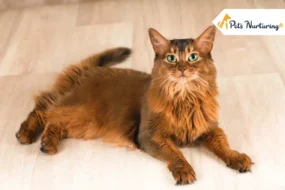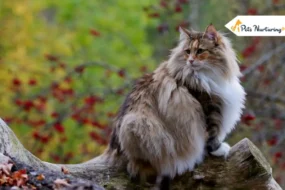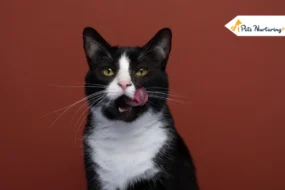
If you are looking for a cat with a personality like a dog, Maine Coon is the best choice.
It is a massive domestic cat breed that’s very popular in North America. They are the official state cat of Maine – hence the name Maine Coon.
These cats are known for their large size and social nature, which gives them the nickname “the gentle giant.”
The dense and thick coat helps them survive in Maine’s harsh climate. However, they can also easily adjust in other regions.
If you are planning to buy a Maine Coon cat, keep reading our guide. Today, we will share all the important details about this cat breed. It will help you decide whether they are a good choice for your home.
Breed Overview
Maine Coon Cat Breed Overview
Breed Name: Maine Coon
Other Names: American Longhair, Gentle Giants
Length: 10 to 16 Inches
Coat: Thick, water-repellent, shaggy
Coat Color: Varied, including tabby, solid, and bicolor patterns
Temperament: Gentle, sociable, intelligent, and friendly
Eye Color: Usually gold, green, or copper
Life Span: Average of 12-15 years
Origin: United States, specifically the state of Maine
The MaineCoon cat has been around in the U.S. since the 1800s, earning its place as the oldest native cat breed in the country. This cat stands out for its big size, sturdy build, and fur that’s like a shaggy blanket. Its ears, looking a bit like those of a bobcat, add to its distinctive appearance.
Despite its imposing looks, the MainCoon cat is actually a big softie! It’s super friendly and chill, known for its gentle nature. Want to know more about the lovable Maine Coon cat?
You can take Maine Coons on a walk using a leash.
History

Back in the late 19th century, Maine Coons were a hit at cat shows. But later, the breed faced a tough time when long-haired breeds from other countries showed up in the early 20th century. However, they made a comeback, ranking as the third most popular pedigree cat breed globally in 2020.
Maine Coon cats hail from Maine, yet their beginnings are shrouded in mystery, surrounded by folk tales and myths. Some stories suggest these cats might be hybrids with animals like raccoons or bobcats.
Another tale links them to Viking ship cats, possibly evolving into what’s now known as the Norwegian Forest cats. There’s the intriguing tale involving Marie Antoinette. It suggests her cherished Turkish Angora or Siberian cats made it to the shores of Wiscasset, Maine, and mixed with other breeds, eventually becoming the Maine Coon we know today.
While myths hinted at connections between the MaineCoon and other long-haired breeds, scientific studies revealed surprising truths. These cats belong to the Western European cat group. The closest relation is found among the random-bred cat population in the Northeastern US, particularly around New York.
Contrary to earlier beliefs, they’re not directly linked to the Norwegian or Siberian Forest cats. Instead, they’re descendants of cats brought by Puritan settlers in the 1600s-1700s, sharing genetic similarities with cats in the United Kingdom.
Their resemblance to other breeds isn’t due to relatedness but rather to similar adaptations shaped by harsh climates. Traits like thick fur, tufted ears and toes, large bodies, and sturdy feet evolved independently in response to survival needs in severe environments.
Around the 1860s, farmers in Maine started showing off their special “coon cats,” a precursor to today’s Maine Coon cat breed, at the Skowhegan Fair. This fair, dating back to 1818, was a big deal! These early Maine Coons vied for the title of Maine State Champion Coon Cat.
In a historic event at Madison Square Garden in New York City on May 8, 1895, a female brown tabby Maine Coon named Cosey snagged the win, marking what’s considered the first American cat show.
Fast forward to 1908, when the Cat Fanciers’ Association documented the Maine Coon as a foundational breed, initially labeled as “Maine Cats.” This breed also earned recognition from the International Cat Association. Finally, in 1985, the Maine Coon officially became Maine’s state cat.
Appearance
Maine Coon cats stand out for their impressive size and appearance. They’re among the biggest domesticated cat breeds, boasting a sturdy physique that catches the eye. Their standout feature? Those tufted ears, crowned with fur, tufts like a lynx’s, not just for looks but also for protecting their ears from tough weather.
Let’s talk tails! Maine Coons rock these bushy tails, often as long as their bodies. These thick, furry tails resemble a majestic plume, adding to their regal appearance.
Until the mid-1980s, the Maine Coon held the title of the largest domestic cat breed until the Savannah cat came along. However, the Maine Coon cats still hold the record for the biggest non-hybrid breed. Typically, males weigh between 18 to 22 pounds, while females range from 12 to 15 pounds.
When it comes to size, these cats vary quite a bit. Adults can stand anywhere from 10 to 16 inches tall, stretching up to 38 inches in length, tail included. Speaking of tails, theirs are long, furry, and tapering, much like a raccoon’s.
In 2010, a male purebred Maine Coon named “Stewie” snagged the Guinness World Records title for the “Longest Cat,” measuring a whopping 48.5 inches from nose to tail tip.
| Category | Height | Weight |
| Male | 10 to 16 inches | 18 to 22 pounds |
| Female | 10 to 16 inches | 12 to 15 pounds |
Maine Coons like to sing by making chirping sounds.
Coat and Color

Maine Coon cats have long to medium-length hair that feels soft and silky, though the texture might differ based on the coat color. Their coat is shorter on the head and shoulders but longer on the stomach and sides.
Some have this majestic ruff around their neck, almost like a lion’s mane. Compared to other long-haired breeds, these cats need minimal grooming because their double coat mostly takes care of itself, especially the lighter undercoat.
Their fur changes with the seasons. In winter, it becomes thicker to keep them warm, while in summer, it thins out a bit to keep them cool. If you search for black and white cat breeds with a variety of coat patterns, Maine Coons will appear in the list.
These cats can sport a wide array of colors, just like other cats. They are available in 64 different coat colors and patterns. Maine Coons are among the few cats that are available in gorgeous grey and white color coats.
- Solid: White, blue, red, black, and cream
- Tabby: Classic, ticked and mackerel
- Bi-color: Black and white, red and white, blue and white, cream and white
- Parti-color: Tortoiseshell and blue-cream
- Parti-color and white: Calico, tortoiseshell and white, blue-cream and white
- Shaded and smoke
- Shaded/smoke and white
However, certain shades like chocolate, lavender, Siamese pointed patterns, or “ticked” patterns might signal crossbreeding and aren’t accepted by some breed standards.
Among the Maine Coon patterns, the brown tabby stands out as the most common. On the other hand, black Maine Coons are considered rare and exotic. As for their eye colors, all shades are welcome as per the breed standards, except for blue or odd-eyes.
Characteristics and Temperament
Maine Coon cats are like gentle giants with a personality that’s kind of dog-like. They’re super smart and pick up things quickly, but they’re pretty chill, too. This makes it easy for them to live peacefully with other pets you might have.
Kids usually love them, and Maine Coons get along great with children because they’re so gentle and friendly. They’re not noisy, but they do like to talk softly to themselves, with a meow or chirp every now and then. You might also see your Maine Coon kneading for different reasons.
These clever cats can easily teach new things. They love learning tricks and exploring anything interesting happening around the house. To keep their curious minds busy when you’re not there, give them different toys to play with.
Even though they’re good at adapting, Maine Coons really enjoy having company, whether it’s from people, kids, or other pets. If you’re away a lot or have a full-time job, having two of these cats might be better than one. They’re also a popular choice as a second pet in a household.
Maine Coons are really loving and sociable, but they’re not the usual lap cats. They usually like being close to you but not necessarily right on your lap, especially because they’re pretty big. The best thing is that these cats stay playful like kittens even as they grow older.
- Very affectionate
- Overall friendly nature
- Kid-friendly cats
- Friendly with other pets
- Needs moderate exercise
- Medium energy levels
- Very intelligent
- Can be vocal
- Medium amount of shedding
- Playful
They love to play with water.
Health and Nutrition

Maine Coon cats can eat similar food to other cat breeds. It is best to give them meals rich in animal protein and labeled with nutritional adequacy.
For this specific breed, Royal Canin offers a special diet. Maine Coon kittens can start with Royal Canin’s growth formula and transition to the adult maintenance formula at two years old.
When feeding a Maine Coon cat, opt for wider food and water bowls to accommodate their long whiskers and prevent discomfort. Maine Coons might also enjoy playing in the water, so don’t be surprised if they dip their paws in their water bowl.
Determining the right amount of food for your Maine Coon involves considering factors like weight, health, and lifestyle. Check the food packaging for general guidelines, but consulting your vet is the best way to create a personalized feeding plan.
Adult cats will need food two times a day, while kittens need smaller meals three to four times a day. Look for cat food with an AAFCO statement matching your cat’s life stage.
Kittens need growth-specific food, while adults require age-specific diets. Normally, your cat’s diet won’t need supplements unless advised by your vet. Still, it’s good to ask about joint supplements for potential benefits, especially if recommended.
Common Health Problems
Maine Coon cats typically have a shorter lifespan, around 13 years, compared to other breeds. Due to their tendency to inherit certain diseases, it’s recommended to consider health insurance for Maine Coon kittens.
- Hypertrophic Cardiomyopathy (HCM)
This heart disease often goes unnoticed in its early stages. Symptoms like breathlessness and lethargy might appear as it progresses. To stay ahead:
– At-home DNA tests can identify genetic mutations linked to HCM, which is especially vital for Maine Coons.
– Annual heart ultrasounds are recommended preventive measures.
- Spinal Muscular Atrophy
This disease affects kittens around 3–4 months. It causes weakness and shaky movements. While needing special care, affected cats can lead fulfilling lives.
- Hip Dysplasia
Indicated by reluctance to climb stairs or perching or changes in litter box habits. Managing it involves weight control, a joint-friendly diet, and sometimes surgery for severe cases.
- Chronic Gingivitis
Maine Coons might face gingivitis even as young as seven months. Daily teeth brushing and regular vet visits are crucial for oral health.
- Polycystic Kidney Disease (PKD)
Genetic testing, especially of the parents, helps detect this condition causing kidney cysts and irreversible damage.
Understanding these health issues helps in early detection and appropriate care for Maine Coon cats, ensuring they lead healthier and happier lives.
Behavior and Training

Maine Coon cats often bring a laid-back and affectionate vibe to any home. They’re fantastic with families, enjoying the company of kids and other pets. Rather than meowing a lot, they’ll probably chirp, chatter, or trill, showing their unique ways of communicating.
Keeping your Maine Coon content involves daily social interaction and exercise. Spending about 10 minutes playing with them helps prevent unwanted behaviors like excessive vocalizing or scratching furniture.
Despite playful moments, Maine Coon cats are happy lounging around most of the day—whether in a sunny spot by the window, their cozy bed, or next to you on the couch.
Maine Coons are smart cookies, and they love learning! With positive reinforcement and a training clicker, you can teach them neat tricks (like fist bumping) and essential commands (such as recall). Training adds joy to their life and strengthens their bond with their feline friends.
Fun times for Maine Coon cats include playing fetch, basking in the sun on a window perch, taking walks on a leash, enjoying a catio for birdwatching, and solving puzzle toys for mental stimulation.
Exercise Needs
Keep your Maine Coon cat engaged and entertained with interactive toys that make them think and move. Set aside time each day for play—they adore feather wands, laser pointers, and puzzle toys that trigger their hunting instincts.
Get a solid cat tree or scratching post since Maine Coons love to climb and scratch. This helps them exercise and stay mentally sharp. Swap their toys around regularly to keep them interested. You can even teach them tricks or use food puzzles to challenge their brains.
Grooming Needs

Maine Coon cats have thick, long fur that needs regular care to avoid becoming oily or tangled. Here’s how you can keep them looking their best:
- Skin Care
If your cat’s fur seems extra oily, it might be time for a bath. Most Maine Coons are cool with baths, especially if they got used to it when they were young.
- Coat Care
Their fur comes in various colors, but it’s always thick and double-layered. Brushing them at home two to three times a week helps prevent tangles. If mats form, a trip to a pro groomer might be needed.
- Ear Care
Keep their large ears dry and clean to steer clear of infections. If you spot redness, smell, or discharge, it’s vet time to fix it up. Simple steps can keep your Maine Coon looking and feeling great!
- Eye Care
Maine Coons have beautiful eyes in shades like gold, green, or blue. Usually, they don’t need much attention. But if you notice anything odd, like discharge or redness, a vet visit might be in order.
- Nail Trim
Trim your Maine Coon’s nails regularly to avoid them getting too long and uncomfortable. If you’re unsure, it’s best to seek guidance from your vet or a professional groomer.
Main Coons have been successfully cloned in 2004.
Are Maine Coon Cats Hypoallergenic?
Maine Coons aren’t hypoallergenic since they have a protein called Fel d 1 that can trigger allergies. However, they tend to shed less, which can be helpful for people with mild allergies.
To reduce the chance of allergic reactions, take some precautions. Ask your vet and doctor for advice on minimizing allergies when having a Maine Coon cat.
Price
Maine Coon kittens for sale can be anywhere from $1000 to $2000. For instance, a 10-week-old male purebred Maine Coon might be priced at $1500. The price can also go with depending on the coat color, age, and eye color. Typically, the price differs from one breeder to another.
Life Span
Veterinarians and feline experts suggest that most gentle giants live about 12 to 15 years. But, many Maine Coon cat owners question this, as their furry friends often live past 20 years. In fact, the oldest Maine Coon, maybe even the oldest cat ever, lived to an incredible age of 31.
FAQs
You can easily find these cats for sale online or at any reputable breeder’s shop in your area.
Choose Royal Canin Maine Coon food for your feline friend.
Maine Coons are energetic cats but can sleep a lot, mostly up to 16 hours a day.
Conclusion
This is all you need to know about the Maine Coon cat breed. They make great pets because of their independent nature. While they won’t sit in your lap like dogs, they are more social and playful than other cats. What’s best is that they retain the same level of playfulness even when they get older.
Maine Coons are good with families, kids, and pets, which makes them ideal for any household. However, make sure you choose the right breeder when buying a cat. Check their health certificates to ensure they don’t have any genetic conditions.
Explore Further











